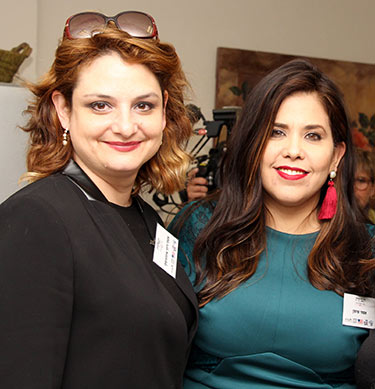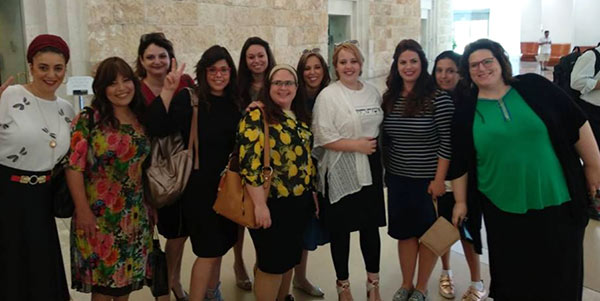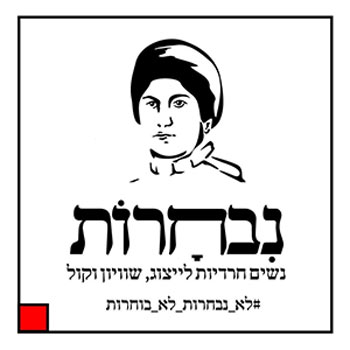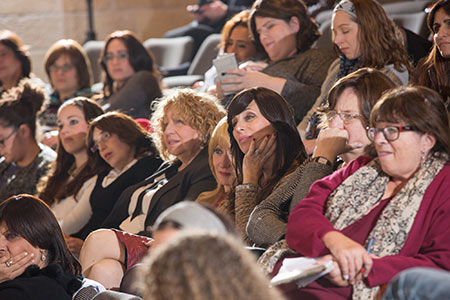Israeli Scene
News + Politics
‘No Voice, No Vote,’ Say Feminist Haredi Women in Israel

Overjoyed, Esty Shushan stands in the august corridors of Israel’s Supreme Court and emotionally embraces her friend and colleague. “We won! We made history.”
“This is for all haredi women! For all Israeli women! For our daughters!” her friend, Estee Rieder-Indursky, responds.
Devoutly religious Jerusalemites who dress modestly and cover their hair, Shushan, 41, and Rieder-Indursky, 44, are reacting to a decision by Israel’s highest court that could bring them one step closer to their goal of expanding the roles for ultra-Orthodox women in public and political life.
These women—Shushan, a filmmaker, public relations professional and mother of four; and Rieder-Indursky, a journalist and mother of seven—see no contradiction in being both haredim and avowed feminists. They refer to themselves as “the last of the suffragists in the modern world.” Six years ago, they founded and now co-direct Nivcharot: Charedi Women for Voice and Equality, a nonprofit organization whose name translates as “elected” or “chosen.”
In feminist circles, participants in this expanding group—part consciousness-raising, part political activism—are popularly known as the “LoNiLoBos,” an acronym of the Hebrew slogan lo nivcharot, lo bocharot—which can be translated as “no voice, no vote.” Implicit in the name is the threat to the haredi political establishment that if they are not included in the political process, the women will not vote for the haredi parties.
Three years ago, an independent lawyer, Tamar Ben-Porat—soon joined by 13 feminist groups—took Nivcharot’s case to Israel’s Supreme Court and demanded that Agudat Yisrael, the leading haredi party in the Knesset, accept women into its ranks and appoint them to the party slate.
On July 31, the court instructed Agudat Yisrael’s lawyer to inform the Council of Torah Sages, the body of rabbis that makes all decisions for the party—including appointing its slate for elections—that if it does not either remove or amend article 6a of its bylaws, which forbids women from joining the party, they should be prepared for a ruling from the court instructing them to do so. A change in the bylaws would open the door to appointment of women to party institutions and activities, under Israel’s existing laws of equity.
Lawyers on both sides agree that the party was likely to accept the court’s recommendation, which could have far-reaching implications for all Israeli women and would certainly impact the two current haredi political factions, Shas and United Torah Judaism, which control 13 of the 120 seats in the current Knesset.
Furthermore, the court appears to have accepted Nivcharot’s main point, as Rieder-Indursky puts it: “The exclusion of women from social and political decision-making institutions has nothing to do with religious law and everything to do with increasingly misogynist ideologies and practices within the community.”
Rieder-Indursky and Shushan are among those who have faced pushback and even personal threats from the ultra-Orthodox establishment, but they remain resolved. “Haredi leaders must realize: changes are in the wind,” says Shushan. “They can tell us to go to other, non-haredi, parties, accuse us of not being ‘true’ haredi women. But the haredi world is our world, and the haredi parties are our political home.”
The haredi community makes up approximately 11 percent of Israeli society, totaling close to 1 million people, according to the Statistical Report on Ultra-Orthodox Society in Israel, issued in 2016 by the Israel Democracy Institute. Although there are many different streams and sects, haredi society in general is led by its rabbis, who have traditionally surrounded their communities by what is often referred to as “walls of holiness” to protect them from the influences of the outside world. While a minority of the ultra-Orthodox communities do not recognize the validity of the State of Israel and therefore do not participate in elections, the majority do vote—for the parties their rabbis choose.

In this world of strictly defined gender roles, the highest ideal for a man is to dedicate himself to full-time, lifelong study in a yeshiva. For women, life centers on childbearing and raising a family. According to the 2016 report, haredi women have a high fertility rate—averaging 6.9 children per woman, compared to 3.1 in the general Jewish population. At the same time, most haredi women must also work outside the home to help support their family so their husbands can continue their studies.
Rieder-Indursky and Shushan consider themselves part of a group that is commonly referred to as “modern haredim.” Unlike a number of the Hasidic sects, which are becoming increasingly insular and extreme in their interpretations of gender separation, modern haredim believe they can integrate into the modern world without sacrificing their religious and cultural commitments.
While some modern haredi women are able to develop careers in technology, journalism, law and medicine, most are constrained by their generally low levels of education and the traditional roles assigned to women. They are often relegated to working within haredi neighborhoods, usually in education or secretarial work, and are vulnerable to exploitation and low wages.
After years of quiet, often surreptitious, organizing in cities and towns throughout Israel, the leaders of Nivcharot say that participation in their cause is increasing, which, in turn, is emboldening them to step up the group’s public profile. Their two-year-old Facebook page has close to 14,000 followers, and a private Facebook group boasts close to 1,200 members.
“In haredi society, women have traditionally been taught that they should be ‘not seen and not heard,’ ” says Rieder-Indursky, a Ph.D. candidate in gender and cultural studies. “But as modern haredi women become increasingly educated, both secularly and especially religiously, they are coming to realize that they need not silence themselves in order to maintain their religious devotion.”
 In 1948, with the founding of the State of Israel, all citizens were granted the right to vote. At the same time, haredi political parties denied women the right to represent their factions in municipal and general elections. In most of these parties, such as Agudat Yisrael, bylaws prevent women from even joining. Over the years, a few women who identify as ultra-Orthodox have served in the Knesset, but not one has represented ultra-Orthodox parties. Despite the record number of women serving in the current Knesset—34—not one is haredi.
In 1948, with the founding of the State of Israel, all citizens were granted the right to vote. At the same time, haredi political parties denied women the right to represent their factions in municipal and general elections. In most of these parties, such as Agudat Yisrael, bylaws prevent women from even joining. Over the years, a few women who identify as ultra-Orthodox have served in the Knesset, but not one has represented ultra-Orthodox parties. Despite the record number of women serving in the current Knesset—34—not one is haredi.
The current haredi makeup in the Knesset includes the Shas Party, which represents Mizrachi ultra-Orthodox Jews and holds seven seats; and United Torah Judaism, which holds six seats and is made up of an alliance between the Agudat Yisrael and Degel HaTorah parties. Despite their relatively small number, the ultra-Orthodox parties have historically held the balance of power in governmental coalitions, enabling them outsized influence over policy and legislation, including the ability to block initiatives demanding female participation in the haredi parties put forth by sympathetic secular lawmakers.
In 2012, Shushan, the filmmaker, became the first haredi woman to publicly demand that women in her community be permitted to participate in party politics. Looking back, she says now, “I didn’t know much about feminism, I just knew that I felt like I was suffocating. I was also working as a journalist, but only under a male pseudonym.” Editors of the ultra-Orthodox newspaper for which she wrote, she recalls, were concerned that its readers would be outraged if they knew a woman was writing for them. “My community had become increasingly extreme—women sent to the back of buses, some rabbis even demanding that men and women walk on different sides of the sidewalks. I couldn’t stand feeling so helpless.”
She set up a personal Facebook page—a daring act, since many ultra-Orthodox rabbis oppose use of the internet. “There is no moral, value-laden or religious law that prevents women from taking part in political activity in the corridors of government…,” she wrote. Gradually, her Facebook page gained followers and like-minded women began to find each other. In small, informal meetings, a feminist process of consciousness-raising took hold—usually in clandestine meetings, so as not to draw the attention of the community’s rabbis, leaders and, often, even husbands.
“If you don’t live in the haredi community, you just can’t imagine how much courage it takes to be a LoNiLoBo,” says Leahle, 42, a mother of six who works as a teacher’s aide and lives in Mea Shearim, an ultra-Orthodox section of Jerusalem. “I don’t even have the courage to use my full name.”
Like many of the group’s support-ers, Leahle attended her first Nivcharot meeting in a dingy underground bomb shelter in Jerusalem. Her husband, who studies full time in yeshiva, still does not know that she participates in meetings and follows the Nivcharot Facebook page.
“I grew up believing that there could be no greater fulfillment in life,” Leahle says, referring to her marriage to a learned man and raising a large Jewish family. “I would ask my husband whom to vote for, because he knows what the rabbis say.” She says her family is so poor that she often walks to work rather than take the bus. “If I ever had any doubts about anything, I pushed them down deep, because I was afraid of challenging everything I have known since I was a child. And I am still afraid of being ostracized.”

But, she adds, “I know that Nivcharot is pointing to a better way of life for all of us, men and women.”
By the 2015 national elections, several dozen members of Nivcharot were handing out fliers in ultra-Orthodox neighborhoods, asking women to refrain from voting until they were represented. Election data shows that their boycott aim was not effective, but their efforts did bring them attention, some of it positive, some of it—especially from the haredi establishment—negative. Meanwhile, Nivcharot has formally registered as a nonprofit and raises funds from Jewish groups, such as the Jewish federations of San Francisco and MetroWest, N.J., and international philanthropic funds, such as the Friedrich Ebert Foundation, based in Germany, and the American Embassy in Israel.
In addition to its political quest, the group’s activities are geared, Rieder-Indursky says, to make haredi women “aware of the impact that their exclusion from decision-making has on their lives and to combat extremism in haredi communities.” In addition to the parlor meetings, the group offers religious study classes led by women and distribute a monthly informational newsletter to hundreds of subscribers. One of their most popular activities is Cinemama, in which they screen movies that are both acceptably modest and feminist.
Nivcharot has also established a leadership program. Last year, some 30 women gained organizational skills and leadership training as well as learned about human and women’s rights. A similar course is scheduled with a new cohort this fall.
Despite the absence of haredi women in the Knesset, Nivcharot leaders initiated the creation of a Haredi Women’s Caucus. It operates under the auspices of the Knesset Committee on the Status of Women and Gender Equality, which is led by Member of Knesset Aida Touma-Sliman, who represents the Joint List, an alliance of predominantly Arab parties. Made up of representatives of most of the other parties in the Knesset, minus the ultra-Orthodox, the caucus has helped ensure that haredi women’s perspectives are brought to bear on all issues pertaining to women, including unionization and health.
“We need women in the Knesset who will be loyal to their constituency of haredi women and care for our interests,” Racheli Roshgold, an active member of Nivcharot, says vehemently.
Despite its higher profile, Nivcharot has not yet made enough inroads to influence the municipal elections set to take place in October. The group is, however, rapidly gaining support in the non-haredi world. According to a recent study by Hiddush, a nonprofit dedicated to religious freedom and pluralism, 80 percent of the adult Jewish population in Israel agrees that all parties running for the Knesset, including the haredi ones, should allow women to be members and to be included in their slates for election.
Attorney Ben-Porat, who filed the initial petition against the haredi parties with the Supreme Court in 2015, is not haredi. “As a feminist attorney, it is my responsibility to fight for the rights of all women,” says Ben-Porat. Over time, 13 feminist organizations—one of them Arab—signed on. Absent from the petitioners was any haredi group, including Nivcharot, whose leaders are trying to balance their activism with respect and sensitivity to their communities.

In its response to the initial petition, Agudat Yisrael contended that the gender separation in its bylaws is protected by the principle of freedom of religion and cited multiculturalism as a justification. Yet, when sharply questioned by the justices on this point on July 31, the lawyer for Agudat Yisrael acknowledged that there is no particular religious law that forbids women from being a member of Knesset or participating in political life. Rather, he argued, “The cultural approach, according to which women are not involved in public political work, is an inseparable part of the religious belief and values of those who support the party.”
But the Knesset, the women have argued, is not a beit knesset, or synagogue, where women are separated from men and their roles are defined by theology and religious laws. The court, it appears, has accepted this position.
Historically, some of the court’s rulings in favor of equality and individual freedoms have put it at odds with the haredi community, a reality that explains why Nivcharot did not officially back the petition, despite support for its aims. “Too often, haredi society has felt that the Supreme Court does not understand us and rules against our beliefs,” explains Tali Farkash, 36, a haredi feminist activist. “We want our changes to come from within. We do not want to openly do battle against our own society.”
Yet, even this is beginning to change, Rieder-Indursky says. When the court convened its first session in 2016 to hear the petition, no haredi women dared attend. By the second time, last December, seven haredi women came to listen. On July 31, more than two dozen showed up, marking the occasions with smiles and selfies.
But these women know that even with a court victory, it could take years until a woman from their community serves as a member of Knesset from an ultra-Orthodox party. In practice, the Council of Torah Sages could attempt to circumvent the new situation, whether by claiming that “they could not find an appropriate female candidate” or “by placing an unknown woman so low on the slate that she will have no realistic chance of being elected,” explains Shushan.
Still, the court case has widespread implications, says attorney Netta Loevy, of the feminist group Itach-Maaki: Women Lawyers for Social Justice, who presented the case to the Supreme Court as the representative of the feminist organizations. “The court has made it clear that it is not acceptable to exclude women from politics and decision-making.
Changes in conservative societies are hard-won, and the activists are paying a high price for their efforts.
Although no prominent religious authority widely accepted across the diverse haredi community has denounced Nivcharot’s efforts, none has publicly expressed his support, either. Nor has anyone censured the derisive, misogynist statements by religious leaders such as Rabbi Mordechai Neugroschel, a popular lecturer who in 2016 at a male-only convention declared that women who support Nivcharot suffer from “some sort of schizophrenia” and are “in need of psychiatric care.” His comments subsequently went viral on numerous websites. Rabbi Mordechai Blau, a senior member of United Torah Judaism and a one-time candidate for Knesset, has declared that the husbands of women involved in political activity may divorce their wives and will not be required to pay alimony. Other rabbis have warned that any woman who joins Nivcharot should be forbidden from teaching in educational institutions, that she should be ostracized and her children expelled from haredi schools.
In pashkevilim (broadsheets) plastered on walls and billboards in ultra-Orthodox neighborhoods, activists’ husbands have been publicly ridiculed and shamed because they “can’t control their wives.”
Requests to interview husbands were declined, with families citing the sensitivity of the situation.
In some cases, pressure is applied through children. Shushan was forced to obtain a court order to keep her daughter in an ultra-Orthodox school whose principal opposes her activities. Rieder-Indursky says her son often returns from his yeshiva begging her to cease her activism.
The women have also been censured, even spat on in the street, by other women. “I know that our message is a challenge to everything that some of these women have been taught,” Shushan acknowledges.
Energized by the recent court decision, and despite the opposition, the women vow to continue their struggle. “If the state allows the ultra-Orthodox parties to exclude women, then there is no guarantee that other parties won’t do so, and that other forms of exclusion won’t occur in the future,” says Rieder-Indursky. “We are feminists and we know that the place of women within Orthodoxy is an issue for all Israeli women.”
Eetta Prince-Gibson is an award-winning journalist and former editor-in-chief of The Jerusalem Report who now writes for Israeli and international publications.










 Facebook
Facebook Instagram
Instagram Twitter
Twitter
Leave a Reply